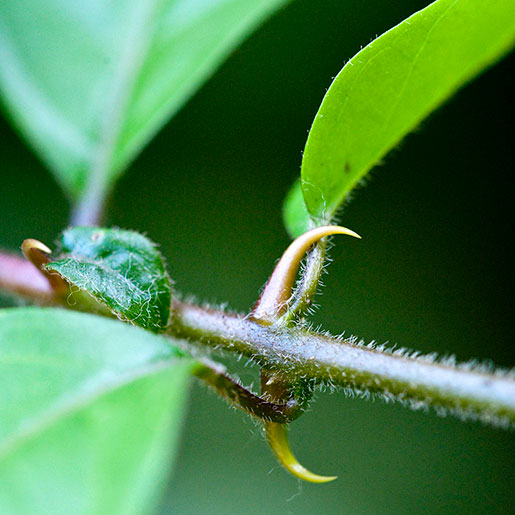Cat’s Claw

Common Names: cat’s claw, uña de gato (not to be confused with cat’s foot or devil’s claw, which are different plants)
Latin Names: Uncaria tomentosa, Uncaria guianensis
Background
- Cat’s claw is a woody vine that grows wild in the Amazon rainforest and other tropical areas of Central and South America.
- The two most common species are U. tomentosa and U. guianensis. Most commercial preparations of cat’s claw in the United States contain U. tomentosa.
- Indigenous people of the Amazon rainforest have used cat’s claw for centuries to ward off disease.
- Today, cat’s claw is promoted for osteoarthritis, rheumatoid arthritis, cancer, viral infections, and other conditions.
How Much Do We Know?
- There have been very few high-quality clinical trials (studies done in people) of cat’s claw.
What Have We Learned?
- There’s no conclusive scientific evidence based on studies in people that supports using cat’s claw for any health purpose, including COVID-19. Some research has been done in people on the effect of cat’s claw on various conditions, but many of the studies did not use rigorous methods and did not include enough study participants to allow definite conclusions to be reached.
What Do We Know About Safety?
- Cat’s claw appears to be safe when used orally for short periods of time, as much as 6 months. However, there is insufficient reliable information about its safety when applied to the skin. Cat’s claw might make the immune system more active, which could increase symptoms of autoimmune diseases. If you have an autoimmune disease, consult your health care provider before using cat’s claw.
- Cat’s claw may slow blood clotting, and this might increase the risk of bleeding during surgery. Talk to your health care provider if you take cat’s claw and you are scheduled to have surgery.
- There are theoretical reasons to suspect that cat’s claw might interact with anticoagulant, antiplatelet, and blood pressure drugs, and other supplements as well. If you take any type of medicine, talk with your health care provider before using cat’s claw or other herbal products; some herbs and medicines interact in harmful ways.
- Some studies of the use of cat’s claw during pregnancy suggest it is unsafe. Little is known about whether it’s safe to use cat’s claw while breastfeeding.
Keep in Mind
- Take charge of your health—talk with your health care providers about any complementary health approaches you use. Together, you can make shared, well-informed decisions.
- Federal Regulation of Herbal Products
- Depending on what’s in them, how they’re intended to be used, and how they’re administered (orally or topically), herbal products are regulated in a variety of ways. Many herbal products intended for oral use are marketed as dietary supplements. The rules for making and distributing dietary supplements are less strict than those for drugs.
- Unlike drugs, dietary supplements are not approved by the U.S. Food and Drug Administration (FDA) before they are sold to the public. When public health concerns arise about the safety of a dietary supplement or an ingredient including an herb, the FDA can take action to protect the public. Manufacturers and distributors of supplements are responsible for evaluating the safety and labeling of their products before marketing to ensure that they meet all regulatory requirements.
NCCIH Clearinghouse
The NCCIH Clearinghouse provides information on NCCIH and complementary and integrative health approaches, including publications and searches of Federal databases of scientific and medical literature. The Clearinghouse does not provide medical advice, treatment recommendations, or referrals to practitioners.
Toll-free in the U.S.: 1-888-644-6226
Telecommunications relay service (TRS): 7-1-1
Website: https://www.nccih.nih.gov
Email: info@nccih.nih.gov (link sends email)
PubMed®
A service of the National Library of Medicine, PubMed® contains publication information and (in most cases) brief summaries of articles from scientific and medical journals. For guidance from NCCIH on using PubMed, see How To Find Information About Complementary Health Practices on PubMed.
Website: https://pubmed.ncbi.nlm.nih.gov/
Office of Dietary Supplements (ODS), National Institutes of Health (NIH)
ODS seeks to strengthen knowledge and understanding of dietary supplements by evaluating scientific information, supporting research, sharing research results, and educating the public. Its resources include publications (such as Dietary Supplements: What You Need To Know) and fact sheets on a variety of specific supplement ingredients and products (such as vitamin D and multivitamin/mineral supplements).
Website: https://ods.od.nih.gov
Email: ods@nih.gov (link sends email)
Key References
- Cat’s claw. NatMed Pro website. Accessed at naturalmedicines.therapeuticresearch.com on August 3, 2023. [Database subscription].
- Ciani F, Cocchia N, Calabrò V, et al. Chapter 45 - Uncaria tomentosa: a promising source of therapeutic agents for prevention and treatment of oxidative stress and cancer. In: Preedy VR, Patel VB, eds. Cancer. 2nd ed. London, UK: Academic Press; 2021:505-514.
- Gregory J, Vengalasetti YV, Bredesen DE, et al. Neuroprotective herbs for the management of Alzheimer’s disease. Biomolecules. 2021;11(4):543.
- Thompson A, Hynicka LM, Shere-Wolfe KD. A comprehensive review of herbal supplements used for persistent symptoms attributed to Lyme disease. Integrative Medicine (Encinitas). 2023;22(1):30-38.
This publication is not copyrighted and is in the public domain. Duplication is encouraged.
NCCIH has provided this material for your information. It is not intended to substitute for the medical expertise and advice of your health care provider(s). We encourage you to discuss any decisions about treatment or care with your health care provider. The mention of any product, service, or therapy is not an endorsement by NCCIH.